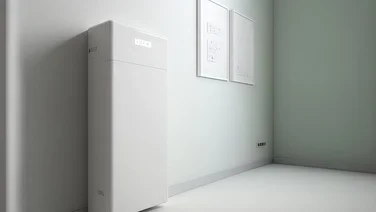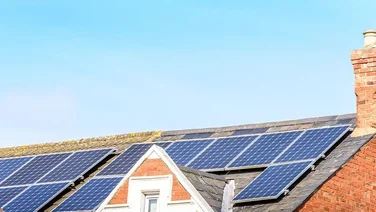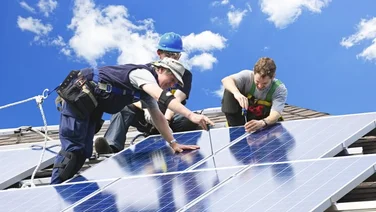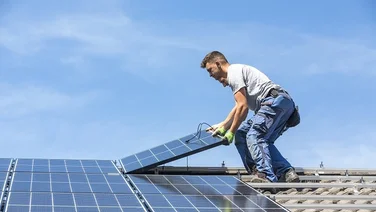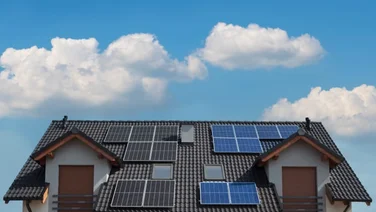We receive a small fee from trusted installers when you request a quote through our site. This helps us keep our content independent, well-researched and up to date – Learn more
- Do solar panels work in a power cut?
- How do you make sure your solar panels work in a power cut?
- Why don’t solar panels automatically work in a power cut?
- How long can solar panels power your home in a power cut?
- Will your solar panels charge your battery in a power cut?
- Should you get a solar battery in case of a power cut?
- Next steps
- Do solar panels work in a power cut: FAQs
- Solar panels can work in a power cut, if they’re installed with a battery and relay
- Power cuts usually cause solar panels to automatically switch off
- 23% of UK homes are affected by power cuts per year

The cost of solar panels is dropping, which means an increasing number of households are now able to save hundreds of pounds on their electricity bills for decades to come.
But before you get solar panels, you’ll want to know all the ins and outs, including whether you can use them to keep powering your home during a power cut.
Thankfully, it’s absolutely possible. In this guide, we’ll explain how you can turn this aspiration into a reality, how much it’ll typically cost you, and whether it’s necessary for your home.
If you’re interested in the specifics on how it continues to generate electricity, use our guide, how do solar panels work? to find out.
If you want to get your own panels, you can compare solar panel prices with our help. Just provide a few quick details, and our expert installers will be in touch with free quotes for you to compare.
Where do you want to install solar panels?
Get startedDo solar panels work in a power cut?
Solar panels can work in a power cut – but only if your installer sets them up with that capability.
Most solar panel systems will automatically switch off when a power cut happens, but for an additional cost, your installer can fit the system with a relay that enables it to send energy from your solar battery to your home when the power’s out.
Without this extra feature, neither your solar panels nor your battery will supply your home with any electricity during a power cut.
How do you make sure your solar panels work in a power cut?
You can make sure your solar panels work in a power cut by opting out of the electricity grid – but you’ll need to be prepared.
If you already live in an off-grid home that isn’t connected to the electricity grid, your panels will continue working as normal.
If not, the other option is to give yourself the ability to temporarily take your home off the electricity grid.
How do you temporarily leave the electricity grid?
You can briefly go off-grid by getting a relay installed alongside your solar battery and panels that will automatically disconnect your system from the grid in a power cut.
If you’d like to know that latest solar battery price, have a look at our dedicated page.
Some solar installers call this an Emergency Power Supply (EPS), but it’s just a switch. Your system will cost more with this addition, but we’re talking hundreds of pounds, rather than thousands.
The relay ensures your solar electricity continues powering your home, but doesn’t travel to the grid, in a process sometimes referred to as islanding.
You should also make sure your battery inverter has a large enough capacity to supply all the electricity you need at any one time, or it could break under the strain.
For instance, if your battery inverter is 2 kW and you try to use a 3 kW oven, it won’t work.
Have a look at your household appliances, consider which ones you’d need during a power cut, and base the size of your battery inverter on how much electricity you’d need to use at once.
Why don’t solar panels automatically work in a power cut?
Solar panels don’t automatically work during a power cut because of safety concerns.
When they’re functioning, your panels send excess electricity to the grid. In the case of a power cut, this could electrocute engineers working on the lines.
For this reason, solar inverters are designed to switch off when they detect a power cut.
How long can solar panels power your home in a power cut?
With a battery, solar panels can run your household’s electricity for hours or even days during a power cut.
The average battery can hold a maximum of 8 kWh and the typical household goes through 7.4 kWh per day, so if you have a full battery and don’t try to save energy, you should have power for more than a day.
If you’re careful with your usage, you can last for days with 8 kWh of solar electricity. Just try to avoid turning on appliances like a washing machine, dishwasher, or oven.
Unfortunately, power cuts usually happen without warning, so you might not be prepared with a fully charged solar battery.
A well-sized solar setup will typically result in you having half a battery’s worth of electricity at any given moment.
In most cases, that’ll see you through a power cut comfortably, especially as power cuts typically don’t last longer than a few hours.
If you’re worried you may need a bigger battery for your home, we recommend tracking your electricity usage with a smart meter – especially as your supplier can install one for free.
When you’re calculating the size of battery you need, make sure to take into account anything crucial that needs a consistent energy source, like machines with a medical purpose.
Will your solar panels charge your battery in a power cut?
Your solar panels will continue to charge your battery during a power cut – but only if they’re set up to do so.
Make sure your installer uses a battery inverter with a higher capacity than the solar inverter, so the battery doesn’t get overloaded.
Otherwise, your battery may simply discharge all its stored energy when a power cut hits.
If your system is installed with this capacity, your panels will keep charging your battery in a power cut, providing you with potentially precious extra hours of electricity.
Should you get a solar battery in case of a power cut?
If your area regularly experiences power cuts, it may well be worth getting a solar battery and a relay to ensure you’ll have electricity even if the lights go out for everyone else.
Power cuts happen to 23% of households per year and last 2.5 hours on average, according to UK Power, so they’re certainly worth taking into consideration – particularly if you have crucial equipment that requires constant power.
On the flip side, if power cuts rarely happen to you and you’re happy with your solar panel system as it is, it’s not always a necessary purchase.
After all, the great majority of UK homes don’t go through any power cuts over the course of a year.
However, most households get a solar battery at the same time they buy solar panels, so they can use more of the electricity their system generates. If you’re already planning on adding a battery, you should think about adding a relay.
For more information, check out our guide, Are Solar Batteries Worth it in the UK?
Next steps
You should now be fully versed on when a solar panel system will and won’t provide you with electricity during a power cut.
If you feel ready to get solar panels, you should ask for multiple quotes, to ensure you secure the best deal for your home.
You can start this process by using our free comparison tool. Simply fill in a few details and our trusted suppliers will get in touch with free quotes.
Do solar panels work in a power cut: FAQs
How can I use solar panels during a power outage in the UK?
You can use solar panels during a power outage in the UK if your system was installed with a specific relay.
This relay is a switch that enables you to flawlessly switch between grid power and your supply of solar electricity.
As long as you have a solar battery with enough charge, you can then continue using solar energy until the grid comes back online in your area.
What happens to solar power when batteries are full?
When a domestic solar battery is full, solar power will go directly towards supplying electricity to your household.
If your panels are generating more energy than your home needs at that point, the excess will automatically be sent to the electricity grid.
If you sign up to a Smart Export Guarantee tariff, you can be paid for this excess energy, with the average three-bedroom household making £159 per year. Otherwise, you’ll get nothing.
How do you use a solar battery during a power cut?
If your solar setup is installed with the right relay, your solar battery will automatically provide you with solar electricity in the event of a power cut.
Then it’s just a matter of limiting your electricity usage, both to conserve energy and to ensure your battery inverter doesn’t get overwhelmed and stop working.
Check your battery inverter’s capacity, and keep your electricity consumption below that limit.



